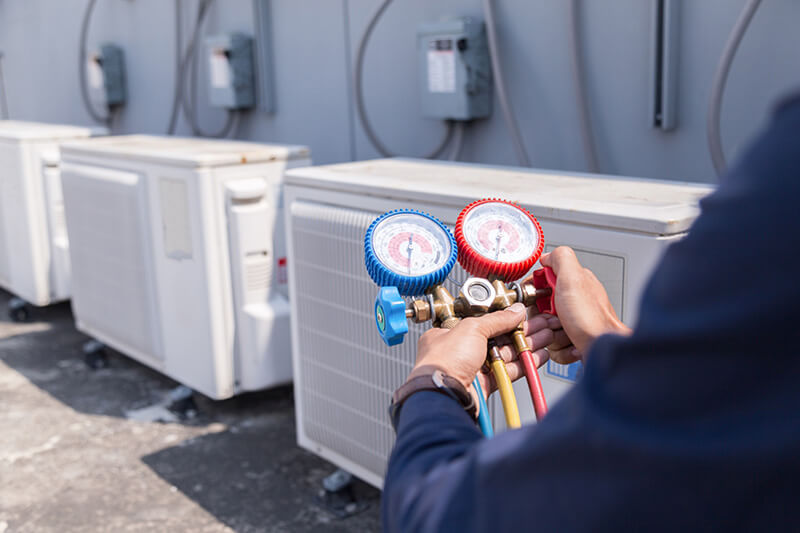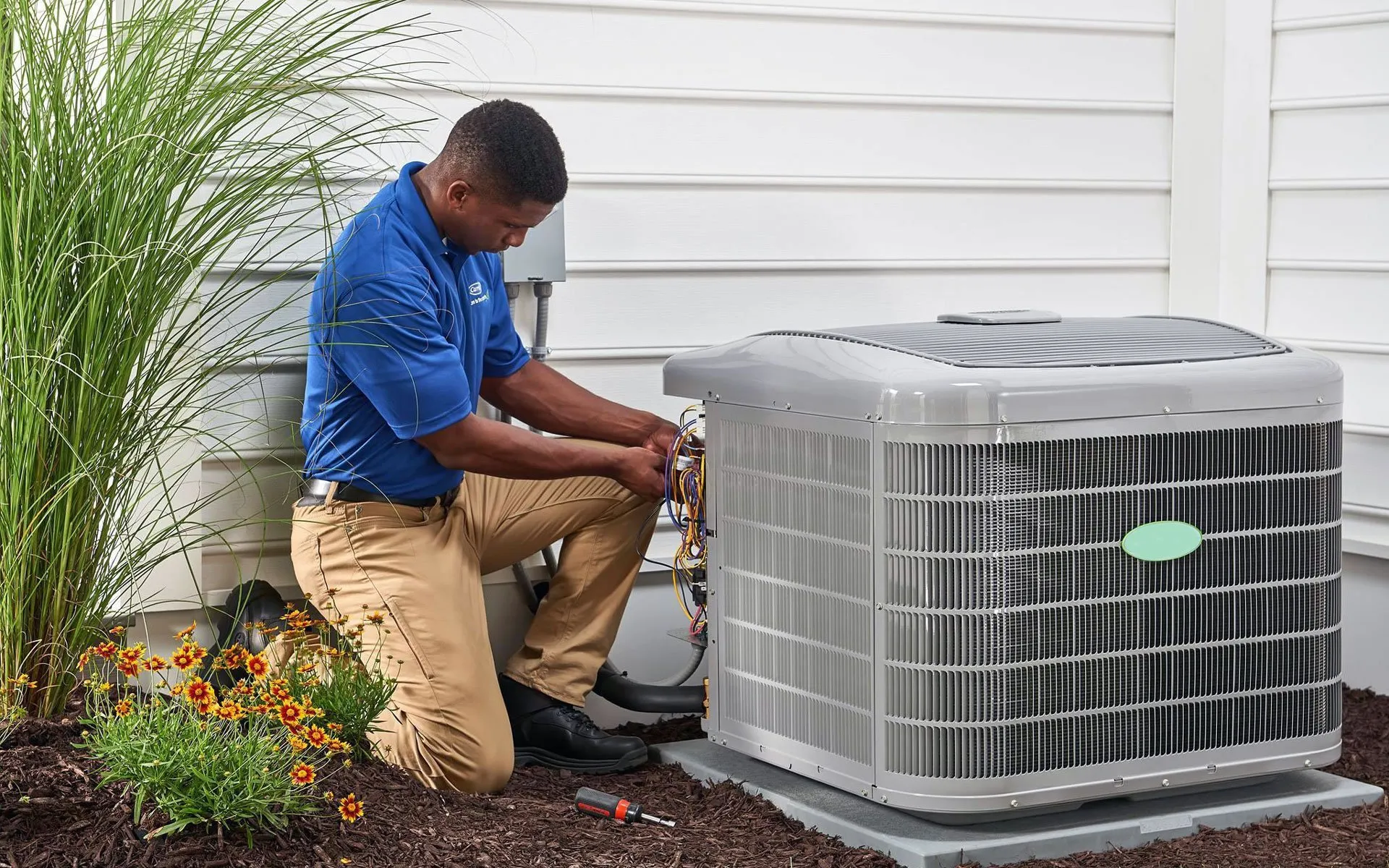Picking In Between a Heatpump and Heating System: Secret Factors To Consider for Your HVAC Needs
When examining heating alternatives for a/c needs, the choice in between a heatpump and a heater can be complicated. Each system offers distinct advantages customized to particular climates and energy performance goals. Understanding these differences is vital for making an enlightened selection. Key variables such as setup prices and ecological effect further make complex the option process. Which alternative really lines up with one's convenience and sustainability choices? The adhering to areas will explore these factors to consider in detail.
Comprehending Warmth Pumps: Just How They Function and Their Benefits
While numerous property owners consider different home heating alternatives, comprehending exactly how heatpump function and their benefits can substantially affect their choice. Warmth pumps run by moving heat rather than producing it. In the wintertime, they extract warm from the outside air or ground and transfer it inside, while in the summer season, they reverse this process, cooling the home by eliminating warmth outside. This double performance makes them flexible for year-round environment control.One of the key advantages of heatpump is their power efficiency. They use substantially much less electrical power compared to traditional heating systems, possibly resulting in lower energy expenses (heat pump service). Additionally, heat pumps have a smaller carbon impact, making them an environmentally friendly selection. They likewise need less upkeep than standard systems, contributing to long-lasting price financial savings. In general, comprehending the mechanics and benefits of warmth pumps can help home owners make informed choices concerning their home heating and cooling needs
Exploring Furnaces: Types, Operation, and Advantages
Heating systems can be found in different types, including gas, electrical, and oil versions, each with unique operational systems. Comprehending these distinctions is essential, as they affect efficiency and home heating performance. In addition, heating systems use numerous benefits, such as regular warmth output and integrity in chillier environments.
Kinds of Heating systems
Heater can differ considerably in style and operation, with heaters being a preferred selection amongst property owners. There are a number of kinds of heaters, each using various gas sources and modern technologies. Gas heating systems prevail, leveraging gas to generate warmth effectively. Electric heaters, on the other hand, use electrical resistance to create warmth, commonly favored for their straightforward installation. Oil heaters, while much less common, are effective in locations with limited gas gain access to (heat pump installation ooltewah tn). In addition, condensing heaters optimize power efficiency by capturing and reusing exhaust gases. Each kind runs via a system of heat exchangers and ductwork to disperse warm air throughout a home. Recognizing the differences in between these heater kinds is essential for educated heating and cooling decisions
Benefits of Heaters
For house owners seeking reliable warmth throughout chilly months, the benefits of furnaces are considerable. Heaters give constant home heating, guaranteeing even temperatures throughout the home. They are especially efficient in severe chilly, commonly outshining heatpump in freezing problems. Different kinds, including gas, electrical, and oil furnaces, supply flexibility to fulfill varied requirements and preferences.Furnaces additionally often tend to have reduced initial installation prices compared to warm pumps, making them a more available option for many. Their robust style contributes to a longer life expectancy, with many devices lasting over 15 years with proper maintenance. Furthermore, modern heaters are often furnished with sophisticated technology for boosted performance, which can cause reduced energy costs. Overall, furnaces continue to be a dependable choice for efficient home heating.

Power Efficiency: Comparing Warmth Pumps and Furnaces
When contrasting energy effectiveness between heatpump and heaters, the Seasonal Energy Effectiveness Ratio (SEER) plays a vital role in identifying efficiency. In addition, a functional expense evaluation discloses the long-lasting monetary implications of each system. Understanding these variables can lead property owners in making educated decisions about their heating options.
Seasonal Power Performance Ratio
Energy performance plays a necessary duty in the decision-making process in between heatpump and furnaces, especially when considering the Seasonal Energy Effectiveness Ratio (SEER) This statistics measures the cooling efficiency of heatpump over an entire air conditioning season, supplying a standard way to review efficiency. Greater SEER scores show better energy performance, converting to lower power usage and reduced utility bills. On the other hand, heating systems are usually analyzed using the Yearly Fuel Utilization Performance (AFUE) score, which shows home heating efficiency. When comparing these 2 systems, home owners must prioritize SEER rankings for heatpump, as they directly impact general power financial savings and ecological sustainability. A complete understanding of SEER can especially influence the long-lasting fulfillment and cost-effectiveness of the selected a/c option.
Operational Cost Analysis
Understanding the operational prices related to warm pumps and heaters is essential for homeowners evaluating their options. Heatpump usually provide greater energy efficiency, converting electric power into warmth with marginal waste. This results in reduced monthly energy bills, particularly you can try these out in modest climates. Conversely, conventional furnaces, especially gas models, may have lower ahead of time expenses however can incur greater operational costs with time as a result of fuel costs and effectiveness ratings.Moreover, heatpump can function as both heating and cooling down systems, potentially minimizing the need for different heating and cooling units. While first financial investments for warmth pumps might be higher, their long-term financial savings in energy performance can make them a much more economical choice for many homes. Careful analysis of neighborhood power rates is necessary to establish the most effective alternative.
Setup Costs: What to Anticipate for Each Heating Unit
Setup costs for heating unit can differ significantly between warm pumps and heating systems, influencing homeowners' choices. Heatpump usually have higher ahead of time installment prices, typically ranging from $3,500 to $8,000, depending upon the unit size and intricacy of installment. This includes the outdoor device, interior handling system, and required ductwork alterations. Conversely, heaters often tend to have reduced initial costs, balancing between $2,500 and $6,000, which can be appealing for budget-conscious house owners. Setup expenses can enhance if considerable ductwork is required.Moreover, the option of gas type for heating systems-- natural gas, gas, or electric-- can additionally affect installment costs. While heat pumps offer energy efficiency, their initial financial investment may discourage some buyers. Inevitably, evaluating installation expenses alongside long-term cost savings and effectiveness will help property owners in making informed decisions about their heating systems.
Environment Considerations: Which System Performs Better in Your Location
How do climate conditions influence the performance of home heating systems? The efficiency of heatpump and furnaces can vary greatly depending upon the regional environment. In moderate climates, warmth pumps succeed by efficiently moving warmth from the outside air, making them an energy-saving option. Nevertheless, their efficiency lessens in extremely chilly temperatures, where they might have a hard time to draw out enough heat. Conversely, heating systems, specifically gas models, offer regular and trustworthy heat no matter of outside problems, making them more effective in colder regions.In locations that experience milder winter seasons, heatpump can operate effectively year-round, supplying both heating & cooling. On the other hand, areas with severe winter seasons often gain from the robustness of heaters. Ultimately, recognizing the local climate is crucial when choosing between a heatpump and a furnace, as it straight influences their operational efficiency and overall efficiency.
Upkeep Needs: Long-Term Treatment for Warmth Pumps vs. Furnaces
While both heatpump and heating systems need routine maintenance click for more info to guarantee peak performance, their specific demands and treatment routines differ substantially. Heating systems usually require less constant interest, with annual examinations being sufficient to look for gas leakages, tidy filters, and analyze total performance. Their less complex layout often permits simple repairs.In comparison, heatpump require biannual upkeep because of their dual role in heating & cooling. This consists of cleaning coils, inspecting refrigerant levels, and guaranteeing that both the outside and indoor devices operate at their finest. In addition, heatpump maintenance commonly involves even more elaborate elements, making specialist servicing essential.Neglecting maintenance can bring about decreased performance and increased power costs for both systems. Inevitably, house owners must think about these long-lasting care requirements when selecting in between a heat pump and a furnace, as aggressive upkeep can extend the lifespan and performance of either system substantially.
Environmental Effect: Selecting a Lasting Home Heating Choice
The ecological influence of heater is a critical evaluation for house owners looking for lasting choices. Heatpump are normally a lot more energy-efficient than conventional heating systems, as they transfer warmth rather than create it, significantly decreasing carbon exhausts. By utilizing renewable resource resources, such as geothermal or air-source heatpump, property owners can further lessen their environmental footprint.On the other hand, all-natural gas furnaces produce greenhouse gases and add to air pollution, though they frequently give greater warmth outcome. Nonetheless, innovations in technology have caused the development of high-efficiency heating systems that lessen emissions.Ultimately, picking a furnace entails evaluating effectiveness against ecological influence. Property owners are urged to review neighborhood energy resources and incentives for eco-friendly systems, making sure an option that aligns with both personal convenience and this contact form environmental responsibility. The decision impacts not only immediate convenience however also long-lasting sustainability and environmental health and wellness.
Frequently Asked Questions
How Much Time Do Heat Pumps and Furnaces Usually Last?
The lifespan of heatpump typically ranges from 15 to 20 years, while heating systems can last between 15 to three decades. Regular maintenance considerably influences their long life and efficiency in offering heating services.
Can I Use a Heatpump in Incredibly Cold Climates?
Heatpump can operate in extremely chilly environments, yet their effectiveness diminishes as temperatures decline. In such problems, supplementary heating resources might be needed to preserve comfortable indoor temperature levels and assure peak efficiency.

What Is the Noise Level of Warmth Pumps Versus Furnaces?
The sound degrees of heatpump and heaters vary considerably. Normally, heatpump operate even more quietly than typical heating systems, making them more effective for those conscious seem, while heaters might create louder functional noises throughout home heating cycles.
Are Warm Pumps Suitable for Both Home Heating and Cooling?
Warmth pumps are indeed appropriate for both heating & cooling (heat pump installation ooltewah tn). They function by transferring warmth, supplying effective temperature control year-round, making them a functional option for home owners looking for an all-in-one cooling and heating remedy
What Size Furnace Do I Required for My Home?
Figuring out the proper dimension heating unit for a home calls for assessing elements such as square footage, insulation quality, regional climate, and the home's layout. Consulting a specialist can ensure an exact assessment and excellent comfort. Warm pumps typically provide higher energy effectiveness, transforming electrical power right into warmth with minimal waste. In modest environments, heat pumps stand out by efficiently moving warm from the outside air, making them an energy-saving option. On the other hand, heating systems, especially gas versions, supply constant and reputable warmth no matter of outdoor conditions, making them more suitable in colder regions.In areas that experience milder winters, heat pumps can operate effectively year-round, providing both home heating and cooling. Warm pumps are normally extra energy-efficient than typical heaters, as they transfer heat rather than create it, significantly reducing carbon emissions. By using eco-friendly power resources, such as air-source or geothermal warmth pumps, property owners can additionally decrease their environmental footprint.On the other hand, all-natural gas furnaces discharge greenhouse gases and contribute to air contamination, though they frequently give higher warmth outcome.
 Christina Ricci Then & Now!
Christina Ricci Then & Now! Atticus Shaffer Then & Now!
Atticus Shaffer Then & Now! Barbara Eden Then & Now!
Barbara Eden Then & Now! McKayla Maroney Then & Now!
McKayla Maroney Then & Now! Kerri Strug Then & Now!
Kerri Strug Then & Now!